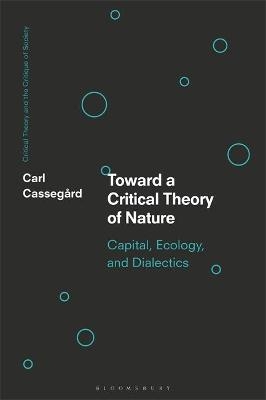
Toward a Critical Theory of Nature
Capital, Ecology, and Dialectics
Seiten
2021
Bloomsbury Academic (Verlag)
978-1-350-15950-1 (ISBN)
Bloomsbury Academic (Verlag)
978-1-350-15950-1 (ISBN)
Challenging the normalization of a capitalist reality in which environmental destruction and catastrophe have become ‘second nature’, Towards a Critical Theory of Nature offers a bold new theoretical understanding of the current crisis via the work of the Frankfurt School. Focusing on key notions of dialectics, natural history, and materialism, a critical theory of nature is outlined in favor of a more traditional Marxist theory of nature, albeit one which still builds on core Marxist concepts to confirm humanity’s central place in manufacturing environmental misery. Pre-eminent thinkers of the Frankfurt school, including, Georg Lukács, Ernst Bloch, Theodor Adorno, and Alfred Schmidt, are highlighted for their potential to diagnose the interpenetration of capitalism and nature in a way that neither absolutizes nor obliterates the boundary between the social and natural.
Further theoretical claims and practical consequences of a critical theory of nature challenge other contemporary theoretical approaches like eco-Marxism, social constructivism and new materialism, to situate it as the only approach with genuinely radical potential. The possibility of utopian idealism for understanding and responding to the current climate crisis is carefully measured against the dangers of false hope in setting out realistic goals for change. Environmental change in turn is seen through the prism of recent cultural currents and movements, situating the power of a critical theory of nature in relation to understandings of the Anthropocene; concepts of apocalypse, and postapocalypse. This book culminates in a powerful tool for an anti-capitalist critique of society’s painfully extractive relationship to a deceptively abstracted natural world.
Further theoretical claims and practical consequences of a critical theory of nature challenge other contemporary theoretical approaches like eco-Marxism, social constructivism and new materialism, to situate it as the only approach with genuinely radical potential. The possibility of utopian idealism for understanding and responding to the current climate crisis is carefully measured against the dangers of false hope in setting out realistic goals for change. Environmental change in turn is seen through the prism of recent cultural currents and movements, situating the power of a critical theory of nature in relation to understandings of the Anthropocene; concepts of apocalypse, and postapocalypse. This book culminates in a powerful tool for an anti-capitalist critique of society’s painfully extractive relationship to a deceptively abstracted natural world.
Carl Cassegård is Professor in the Department of Sociology and Work Science at The University of Gothenburg, Sweden, where he is currently researching environmental activism.
Preface
1. Introduction: What is a critical theory of nature?
2: Marx’s three materialisms
3: Natural history and the primacy of the object
4: Capitalism and the domination of nature
5: Marx, value and nature
6: Constellations and natural science
7: Eco-Marxism’s return to Marx
8. World-ecology and the persistence of non-Cartesian dualism
9: New materialism and dark ecology
10: Utopia, the apocalypse and praxis
References
| Erscheinungsdatum | 24.02.2021 |
|---|---|
| Reihe/Serie | Critical Theory and the Critique of Society |
| Zusatzinfo | 10 bw illus |
| Verlagsort | London |
| Sprache | englisch |
| Maße | 156 x 234 mm |
| Gewicht | 535 g |
| Themenwelt | Geisteswissenschaften ► Philosophie |
| Naturwissenschaften ► Biologie ► Ökologie / Naturschutz | |
| ISBN-10 | 1-350-15950-6 / 1350159506 |
| ISBN-13 | 978-1-350-15950-1 / 9781350159501 |
| Zustand | Neuware |
| Haben Sie eine Frage zum Produkt? |
Mehr entdecken
aus dem Bereich
aus dem Bereich


